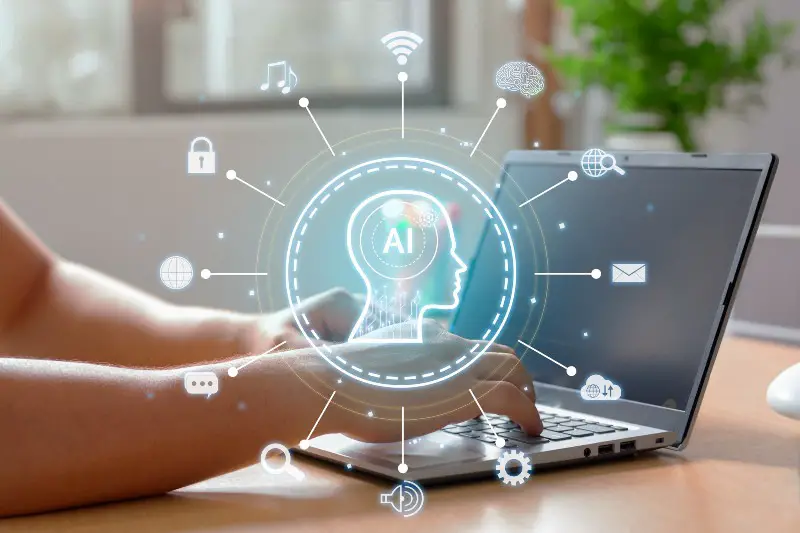Introduction
In the dynamic landscape of Artificial Intelligence (AI), AI Horizon stands as a pivotal force driving significant transformations in various sectors, including healthcare, education, and digital security. This blog post aims to explore the profound impact of AI in these areas, focusing on its integration in healthcare, its role in enhancing the learning experience for students and educators, the advancements in machine learning, and the critical aspect of privacy and security. Each of these domains is experiencing a paradigm shift, driven by the innovative applications of AI. We will navigate through the myths and realities, offer practical advice, and delve into the implications of AI in these fields.
AI Horizon is more than just a technological trend; it’s a new reality that’s redefining how we approach health, education, and digital security. Whether you’re a healthcare provider, an educator, a student, or someone interested in the evolving world of digital security, this post will provide comprehensive insights into how AI is revolutionizing these areas. Join us as we explore the opportunities and challenges presented by the AI Horizon.
Healthcare and AI
Transforming Healthcare with AI
In healthcare, AI is revolutionizing patient care, diagnostics, and treatment methodologies. AI algorithms can process vast amounts of medical data, leading to more accurate diagnoses and personalized treatment plans. This advancement is not only enhancing the quality of healthcare but also making it more accessible and efficient.
AI’s Role in Medical Research
Beyond patient care, AI significantly impacts medical research. It aids in analyzing complex datasets, accelerates drug discovery, and contributes to understanding intricate health conditions. AI’s ability to process and interpret large volumes of data is invaluable in medical breakthroughs, potentially leading to cures for previously untreatable diseases.
Students and Educators and AI
AI in Enhancing Learning Experiences
For students and educators, AI is a transformative tool in the educational landscape. It personalizes learning experiences, adapts to individual learning styles, and provides interactive and engaging educational content. AI is reshaping how knowledge is delivered and absorbed in the classroom.
AI’s Role in Educational Research and Development
AI is playing a crucial role in educational research and development. It’s being used to analyze educational trends, improve teaching methodologies, and develop new learning tools. AI is paving the way for a more informed and innovative approach to education.
Machine Learning and AI
The Power of Machine Learning in AI
Machine Learning, a subset of AI, is revolutionizing the way AI systems learn and evolve. It involves algorithms that learn from data, identify patterns, and make decisions with minimal human intervention. Machine Learning is at the heart of many AI applications, from predictive analytics to natural language processing.
Expanding Applications of Machine Learning
The applications of Machine Learning are vast and continually evolving. It’s being used in various sectors, including healthcare for predictive diagnostics, in education for personalized learning, and in business for customer behavior analysis. As technology advances, Machine Learning is set to become more sophisticated and integrated into various aspects of life.
Privacy and Security in the Age of AI
Balancing AI Advancements with Privacy Concerns
The integration of AI into various sectors raises significant privacy and security concerns. As AI systems become more adept at processing and analyzing data, the risk of personal data misuse and privacy breaches increases. It’s crucial to balance the benefits of AI with robust privacy and security measures.
AI’s Role in Enhancing Cybersecurity
Conversely, AI can play a crucial role in enhancing cybersecurity. AI systems, through pattern recognition and anomaly detection, can identify potential threats and breaches more efficiently than traditional methods. This proactive approach is vital in an era where cyber threats are increasingly sophisticated.
Myths vs. Facts about AI in Education
Myth: AI Will Replace Teachers
Fact: AI is designed to augment, not replace, educators. It enhances teaching capabilities by providing personalized learning tools and insights into student performance.
Myth: AI in Education is Limited to High-Tech Subjects
Fact: AI’s application in education extends beyond high-tech subjects. It’s being used across various disciplines to enhance learning experiences and teaching methodologies.
Myth: AI Makes Education Impersonal
Fact: AI can actually make education more personalized and engaging by adapting to individual learning styles and providing interactive content.
FAQ Section
Q1: How is AI Transforming Healthcare?
A1: AI is transforming healthcare by improving diagnostic accuracy, enabling personalized treatments, and facilitating advanced research. It’s making healthcare more efficient and patient-centric.
Q2: What Role Does AI Play in Enhancing Education?
A2: AI plays a significant role in enhancing education by personalizing learning experiences, providing interactive content, and aiding in educational research and development.
Q3: How is Machine Learning Used in AI?
A3: Machine Learning in AI involves algorithms learning from data, identifying patterns, and making decisions. It’s used in various applications like predictive analytics and natural language processing.
Q4: Why is Privacy and Security Important in AI?
A4: Privacy and security are important in AI to protect sensitive data, prevent misuse of AI systems, and ensure ethical use of technology.
Q5: Can AI Improve Healthcare Outcomes?
A5: Yes, AI can significantly improve healthcare outcomes by providing accurate diagnostics, personalized treatment plans, and aiding in advanced medical research.
Practical Tips and Tricks for AI Integration
- Emphasize Data Quality: High-quality, diverse data is crucial for training effective AI systems.
- Prioritize Ethical Considerations: Focus on developing AI solutions that are fair, transparent, and respect privacy.
- Stay Informed: Keep up with the latest developments in AI to understand its evolving capabilities.
- Collaborate and Communicate: Effective AI integration requires collaboration across various departments and clear communication about AI capabilities and limitations.
- Regular Monitoring: Continuously monitor AI systems to ensure they are functioning as intended and delivering value.
Google Snippets
AI in Healthcare
“AI in healthcare involves using algorithms and software to analyze complex medical data, leading to enhanced diagnostics, treatment planning, and patient care.”
Machine Learning in AI
“Machine Learning in AI refers to the technology that enables AI systems to learn from data, identify patterns, and make decisions, used in various applications.”
Privacy and Security in AI
“Privacy and security in AI are crucial, involving protecting sensitive data and ensuring AI systems are used responsibly and ethically, especially in data-intensive applications.”
Artificial Intelligence Meaning
- Oxford Languages: “Artificial intelligence involves the development of computer systems able to perform tasks normally requiring human intelligence, such as visual perception, speech recognition, and decision-making.”
- Merriam-Webster: “A branch of computer science dealing with the simulation of intelligent behavior in computers.”
- Cambridge Dictionary: “The study of how to produce machines that can do things which would require intelligence if done by humans.”
Did You Know?
- AI algorithms have been used to predict patient health outcomes, significantly improving treatment plans.
- Machine Learning is being used to develop educational tools that adapt to individual learning styles.
- Ethical considerations in AI are leading to new policies and guidelines to govern AI development and use globally.
Conclusion
The journey through the AI Horizon reveals the transformative impact of AI across healthcare, education, and digital security. As we embrace this new era, it’s crucial to balance technological advancement with ethical considerations and privacy concerns. AI’s potential is vast, offering opportunities for innovation and improvement in various sectors. However, navigating this landscape requires a thoughtful approach, ensuring that AI benefits society as a whole and respects individual rights. The AI Horizon is not just about the future; it’s about shaping a better world with the tools and technologies we develop today.






